The End Of Old Fashioned Retail Politics?
Is technology making retail politics less important?
In a report that seems absolutely counterintuitive given how common it’s become to bemoan the role of money in politics The Washington Post reported yesterday that the Republican primary race for 2012 is set to be one of the least expensive in a decade:
Dec. 1 (Bloomberg) — Even as experts predict that the 2012 presidential race will be the most expensive in U.S. history, a funny thing is happening on the way to the Republican nomination: It’s becoming one of the cheapest primaries in a more than a decade.
The top nine Republican candidates spent $53 million through September, compared with $132 million spent at the same time four years ago. The sum is even lower than totals reported during the same period in the 2004 and 2000 primaries — when most candidates still were abiding by campaign spending limits in order to receive public matching money.
In the crowded Democratic primary in 2004, the candidates had spent $58 million through Sept. 30, 2003. Four years prior, a primary field of ten Republican candidates had spent $68 million in the first three quarters of 1999.
One major difference is a profusion of televised debates — 11 so far — negating the need for costly commercials.
“The debates and the daily drama of the Republican presidential primary are the new TV,” said Ken Goldstein, president of Kantar Media’s Campaign Media Analysis Group in Arlington, Virginia.
The spending slump is having an effect on the campaign trail. Advertising in the first two states to hold contests, Iowa and New Hampshire, has plummeted 75 percent. And candidates who have barely registered in what’s sometimes called “the money primary” are vaulting into the lead.
While the drop off in ad spending is no doubt disappointing the Iowa and New Hampshire (and Boston) media, it doesn’t seem to have had much of an impact on interest in the race, or the polls. In fact, it’s worth noting that the last two candidates to rise in the polls — Herman Cain and Newt Gingrich — have also been the two candidates to have the least active ground operations in states like Iowa and New Hampshire, or anywhere else for that matter. Instead, they, like many of the other candidates, communicate with their supporters and potential voters via the debates, media appearances (principally Fox News Channel), and the Internet. We’ve also learned that it’s possible to create an ad, post it on YouTube, and watch it go viral. Outside of the production costs for such videos, which can be minimal when you’re talking about something as simplistic as the famous Herman Cain “smoking” ad, the campaign spends absolutely nothing on the ad and yet ends up getting tons of free media when the ad gets played, repeatedly, on the cable networks. It’s really a quite ingenious strategy.
The question we don’t know the answer to yet is whether this kind of under-the-radar non-traditional campaign can lead to electoral success. In Newt Gingrich’s case in particular, there is a serious question as to whether or not his lead in the recent polls in Iowa really means anything considering that he essentially has no organization in that state. Traditionally, campaigns with a good ground organization are the ones that succeed electorally, especially in caucus states where getting your supporters to a specific location at a specific time is even more essential than in states that hold primary elections. Other candidates further down in the polls, such as Rick Perry, Michele Bachmann, and Rick Santorum, have spent far more time in Iowa than Gingrich and have a far more organized ground operation. Under a traditional analysis, one would expect them to be better prepared for caucus day than his campaign will be, meaning that they could end up outperforming their current poling numbers. If Gingrich pulls off an Iowa win, though, then it could be a signal that things really have changed and it makes one wonder if technology is creating a world where old fashioned retail politics isn’t quite as important as it used to be.
H/T: Jazz Shaw
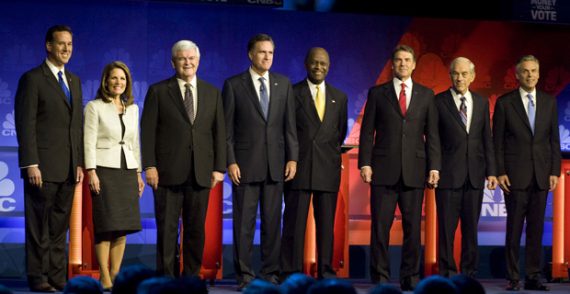

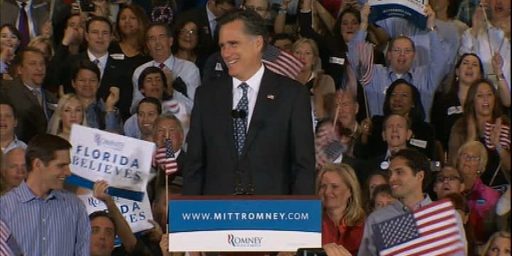
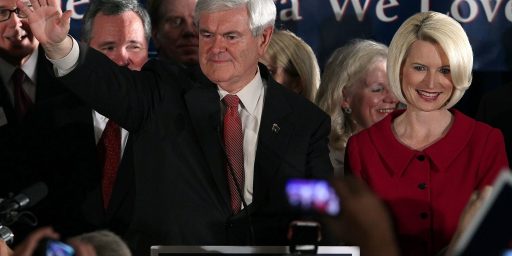
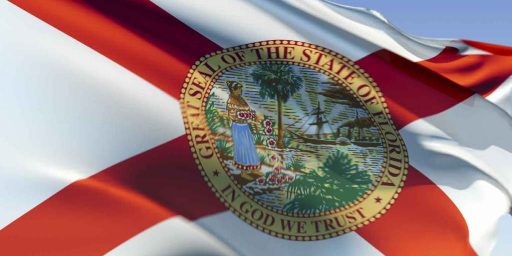
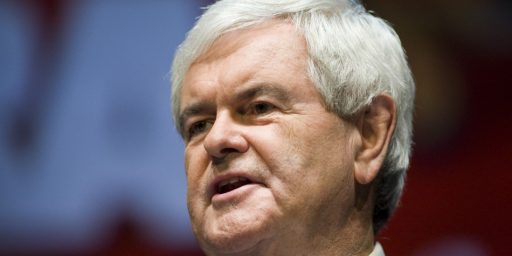
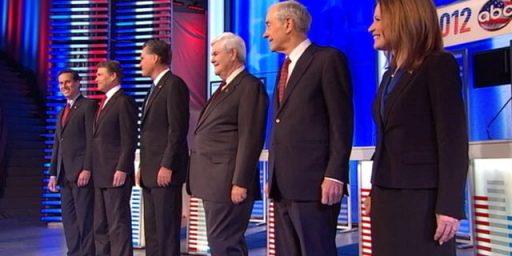
Sorry, Doug, but I don’t see it. For the past several cycles now, we’ve seen all sorts of predictions that the New Thing is going to revolutionize campaigning. While we’ve seen a lot of innovation in the last couple decades, I have yet to see anything that convinces me this cycle is going to be any different re: the ground game.
If you can show me Michelle Bachmann, Herman Cain, or Newt Gingrich triumphing over Mitt Romney is a state other than Iowa, then I’ll listen to your thesis.
What always goes unmentioned though is that campaign infrastructure really only matters if the race is close. I mean, how many times has anyone been consistently leading in the polls and then lost because the other candidate “had a better ground game”? The last time I can recall such a race was Angle vs. Reid in Nevada, and that appeared to have less to do with campaign operations and more with people finally deciding they couldn’t vote for such a ridiculous candidate.
Mike
@James H: “If you can show me Michelle Bachmann, Herman Cain, or Newt Gingrich triumphing over Mitt Romney is a state other than Iowa, then I’ll listen to your thesis.”
Who had the biggest campaign operation in New Hampshire 2008, Romney or McCain?
Mike
Doug,
It’s not the end, it’s just a new phase of the same thing. Now, instead of buying a bunch of air time to woo voters, major donors just buy the candidates & the media covering them directly. If the top 3 or 4 GOP potentials are all in the Koch Bros’ bullpen, why spend more money convincing voters to choose one over the other? Like Henry Ford said, “You can have it in any color you want, as long as it’s black.”
Speaking of change – no mention of the Murdoch primaries.
I’m just posing a question here, guys. I haven’t reached a conclusion myself,. The comments so far have been interesting.
I did mention Fox News appearances. To be honest, though, there is a certain logic in candidate for the GOP nomination appearing primarily on a network that has a heavily Republican viewership. You didn’t see Barack Obama or Hillary Clinton spending much time on Fox in 2008
@MBunge:
I don’t recall who was leading in the polls, but I do remember most pundits saying that Obama won in Iowa ’08 because he had a better ground game. That and the fact that Hillary didn’t take him serious enough.
@James H: Look at Newt’s numbers in FL and SC. If Newt wins IA, keeps things close in NH, while winning SC and FL, Romney will be done and it will show that organizing means less in GOP politics than one expects.